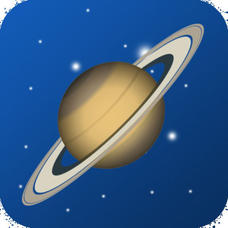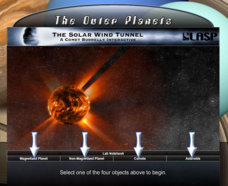Q Continuum
Planets
Have you ever looked up at the night sky and wondered what constellation you were seeing or whether that bright object was a star or a planet? Are you searching for the best tilt-to-view constellation and planet app that money can't buy?...
It's About Time
Environmental Impacts and Energy Consumption
As scientists prove environmental impacts of using coal as an energy resource, do you think Santa regrets giving out so much of it? Through a demonstration of acid rain, pupils learn what makes it, where it occurs, the impact of it, and...
Howard Hughes Medical Institute
Winogradsky Columns: Microbial Ecology in the Classroom
Winogradsky columns are ideal for observing the role of bacteria and other microorganisms in an ecosystem. This student activity guide is complete with data tables for observations and analysis questions for processing what was observed....
Norwich University
Seven Man-Made Engineering Wonders of the Ancient World
Imagine precisely cutting and then moving a 120 ton boulder more than two miles without mechanical cutting tolls, skid loaders, or hydraulic cranes. Imagine carving a stone figure that includes a drainage system that permits rainwater to...
UAF Geophysical Institute
Carbon Footprint
Your young environmentalists can calculate their carbon footprint and discuss ways to reduce it with a worksheet about climate change. After reading a handout about what impact one's carbon footprint can have on the environment, kids...
SF Environment
Sort and Color!
Sorting is a very important skill that can be used in math and even science. Learners get familiar with some environmentally friendly vocabulary terms as they practice separating objects that can be recycled from those that can't. They...
Space Awareness
Star in a Box
What happens to stars as they get older? A simulation takes pupils through the life cycle of stars based on their masses. The resource introduces the Hertzsprung-Russell diagram and the common relationships and life cycle patterns observed.
Baylor College
Post-Assessment: Global Atmospheric Change
Find out how much your earth scientists learned about the atmosphere in the unit on global atmospheric change with this assessment. After writing a letter to persuade others to make changes to protect our atmosphere, pupils take the same...
Wild BC
Greenhouse Gas Guzzlers
Teams of six to eight players imagine that they are driving in a vehicle and collect balls that represent carbon dioxide emissions based on their different activities. "Greenhouse Gas Guzzler" cards tell teams how many balls to collect...
Laboratory for Atmospheric and Space Physics
The Solar Wind Tunnel
The winds of change are blowing in our very own solar system! But what makes some heavenly bodies more affected by solar winds than others? Pupils discover the concept of magnetic forces at work in space in this attractive interactive,...
Colorado State University
Can it Really Rain Fish and Frogs?
You've heard of it raining cats and dogs ... but what about fish and frogs? It turns out, one scenario is much more likely than the other! Intrepid weather investigators examine the curious behavior of waterspouts using a leaf blower,...
Curated OER
Puzzle it Out
Students study the Earth's climatic system and construct a puzzle that names all of the pieces of the components involved. In this Climate lesson, students draw a picture on a puzzle piece depicting a specific component. Students then...
Curated OER
Bible (Day 7) Redemption and Caretakers
Whether you are religious or not, humans can be caretakers of the Earth. Young scholars will discuss recycling, how their wasteful actions effect the Earth, and the Alaskan oil spill. They then have small group discussion and write about...
Curated OER
What is the Rock Cycle and Its Processes?
Geology beginners examine three different rock samples and determine their origin by their characteristics. By making and recording observations, they become familiar with features of igneous, metamorphic, and sedimentary rock types....
Curated OER
Science Review for Grade 5 (5.2)
In this science review for grade 5 (5.2) worksheet, 5th graders answer 25 earth science questions in a standardized test format, including reading maps and diagrams.
Curated OER
Where Am I?
Extensive background on marine navigation is provided for you as the teacher. Assign groups to research marine navigation techniques and construct astrolabes. Resource links are listed for extension ideas. If you are teaching an...
Curated OER
Who Ever Heard of the Big Bang?
Students examine the theories that attempt to explain the origins of the Universe. Some theories are based on scientific facts. Others find their source in folklore. The variety of beliefs systems are discussed as a motivating factor for...
Curated OER
What are Brazil's Natural Resources?
High schoolers appreciate the gifts of natural resources on our planet and foster ways to protect them. They develop an awareness of the natural resources that are found in Brazil and use the Internet to research Brazil's resources.
Curated OER
Gallery Walk Questions about Energy and Material Cycles
Students state the physical, chemical or biological processes associated with these environments: Pelagic ocean zone, California coat Cave, Indiana Barrier island beach, North Carolina Sand dune, Dunes National Park, Colorado Wetland and...
Curated OER
Planets in Balance
Students study the solar system by researching the planets. In this exploratory lesson plan students divide into teams and create mobiles.
Curated OER
Planetary Weather
Students study the weather on other planets in our solar system. In this planetary weather lesson students create a display of the different weather conditions on the other planets.
Curated OER
Constellations
Young scholars explore the major constellations. After reviewing the Earth's basic motions and their significance, students discuss the moon's orbit and revolutions. Using a Digitarium Alpha portable planetarium projector, they observe...
Curated OER
The Nine Planets
Sixth graders examine and investigate the solar system. They participate in a Webquest, and create a Powerpoint presentation that is meant to be a research guide to help alien visitors find a suitable habitat in the solar system.
Curated OER
The Magic School Bus Lost in Space
Students identify the planets by making two models of the Solar System. They create a model that shows the order of the planets and a model that shows the planets sizes as compared to one another. They may write about the planet they...

























